Owning a dog comes with the responsibility of ensuring their good health and well-being. One crucial aspect of pet care is keeping track of their vaccinations. A dog vaccination record template is a valuable tool that allows you to monitor your furry friend’s immunization history and stay organized. By properly maintaining this record, you can ensure that your dog receives all the necessary shots to protect them from preventable diseases. Let’s delve into the importance of a dog vaccination record and how you can use it effectively to keep your pet healthy.
Table of Contents
What are vaccination records for dogs?

Vaccinations play a critical role in safeguarding your dog’s health. They help protect them from contagious and potentially life-threatening diseases, such as rabies, distemper, parvovirus, and hepatitis. Vaccinations work by stimulating an immune response in your dog’s body, preparing it to fight off any future encounters with these diseases.
When your dog receives a vaccination, a small amount of the disease-causing agent, called an antigen, is introduced into their body. This antigen is either a weakened or inactivated form of the disease, which poses no harm to your dog. However, it triggers their immune system to produce antibodies that recognize and attack the specific disease. These antibodies remain in your dog’s system, ready to defend against future infections.
Dog Vaccination Health Record Templates
A well-designed dog vaccination record template should include vital information about your pet. This information typically includes your dog’s name, breed, date of birth, and identification details such as microchip or tag numbers. Additionally, it should have space for the name and contact information of your veterinarian.
Having a comprehensive dog vaccination record is crucial for keeping track of your furry friend’s health. In addition to the essential information mentioned above, it is also beneficial to include details about your dog’s previous medical conditions, allergies, or any specific requirements they may have. This additional information can help ensure that your veterinarian has a complete understanding of your dog’s medical history, allowing them to provide the best possible care.
Decoding Vaccination Terms
Understanding the different terms associated with vaccinations can be confusing. Your dog vaccination record should have a section for decoding these terms, allowing you to better comprehend your pet’s immunization history. Definitions of common vaccination acronyms, such as DHPP (distemper, hepatitis, parvovirus, parainfluenza) or DHPP-L (DHPP plus leptospirosis), can be included to aid your understanding.
By including a section that decodes vaccination terms, you can become more knowledgeable about the specific diseases your dog is protected against. This information empowers you to make informed decisions regarding your dog’s healthcare and helps you understand the importance of regular vaccinations. It also serves as a valuable resource when discussing your dog’s immunization history with your veterinarian, ensuring effective communication and optimal care for your beloved pet.
How to Use a Dog Vaccination Record Template

Keeping track of your dog’s vaccinations is essential for their health and well-being. A dog vaccination record template can be a handy tool to help you stay organized and ensure that your furry friend receives the necessary vaccinations. However, simply filling out the template is not enough; it’s important to do it correctly and update the record regularly to maintain its accuracy.
Filling Out the Template Correctly
When using a dog vaccination record template, accuracy and legibility are key. Take your time to carefully fill out each section, providing all the necessary information. Include the dates on which vaccinations were administered and the names of the specific vaccines given. This detailed information will not only help you keep track of your dog’s vaccinations but also assist your veterinarian in providing the best care possible.
Additionally, if your dog received any booster shots, be sure to note down the dates of those as well. Boosters are important to ensure that your dog’s immunity remains strong and effective. By including this information in the record, you can easily monitor when your dog is due for their next booster shot.
Lastly, remember to sign or initial each entry to validate the information. This simple act adds an extra layer of authenticity to the record and ensures that it is recognized as an official document.
Updating the Record Regularly
Regular updates are crucial for maintaining an accurate dog vaccination record. As your dog continues to grow and age, their vaccination needs may change. Whenever your pet receives a vaccination, whether it’s a routine shot or a special vaccine for travel or specific health concerns, make sure to update the record promptly.
It’s not uncommon for dog owners to misplace their pet’s vaccination record or for it to become unreadable over time. To avoid any potential issues, consider making copies of the record or storing digital backups. Having multiple copies or a digital version can provide peace of mind, knowing that you have a reliable backup in case the original is lost or damaged.
Remember, a dog vaccination record is not just a piece of paper; it’s a vital tool in ensuring your dog’s health and safety. By filling out the template correctly and updating it regularly, you are taking an active role in your dog’s well-being and providing them with the best care possible.
Organizing Your Dog’s Health Documents
Keeping track of your dog’s health is essential for their overall well-being. From vaccination records to medical reports, having all the necessary information in one place can make a world of difference. But why stop at just vaccination records? Let’s explore how you can combine them with other important health information to create a comprehensive record for your furry friend.
When it comes to your dog’s health, there’s more to consider than just vaccinations. Medical reports, test results, medication details, and dietary notes can provide valuable insights into their overall health and any specific conditions they may have. By organizing all these documents together, you can easily access and share the information with your veterinarian whenever needed.
Tips for Safe and Accessible Storage
Now that you understand the importance of combining your dog’s vaccination records with other health information, let’s talk about how to store them safely and accessibly. After all, you don’t want to risk losing or damaging these valuable documents.
Consider investing in a waterproof and fireproof container or folder specifically designed for document storage. This will provide an extra layer of protection, ensuring that your dog’s health records remain intact even in unforeseen circumstances. Additionally, creating digital backups can offer added peace of mind. Store these backups securely online or on a password-protected device to prevent unauthorized access.
Remember, emergencies can happen when you least expect them. It’s always a good idea to inform a trusted family member or friend about the location of your dog’s health documents. This way, if you’re not available, they can quickly access the information and provide it to the necessary parties, ensuring your dog receives the care they need in a timely manner.
Communicating with Your Vet: Making the Most of Your Record
Preparing for Vet Visits
With a well-maintained dog vaccination record, you can make the most out of your vet visits. Before each appointment, review your pet’s vaccination history and make note of any upcoming boosters or vaccinations due. This will help you discuss your dog’s specific needs and any concerns you may have with the veterinarian.
Discussing Your Dog’s Vaccination History and Future Needs
When discussing your dog’s vaccination history, it’s crucial to communicate openly with your veterinarian. Share any adverse reactions or side effects your pet may have experienced in the past. Your vet can then assess if any adjustments need to be made to the vaccination schedule or recommend alternative options tailored to your dog’s health needs.
Having a dog vaccination record template is a valuable tool for responsible dog owners. It enables you to keep track of your pet’s immunization history, maintain their health, and ensure their overall well-being. By understanding the importance of a dog vaccination record and using it effectively, you can stay proactive in protecting your beloved furry friend.
Dog Vaccination Schedule
| Puppy | 6-8 weeks | Distemper, Parvovirus, Adenovirus (Hepatitis) | – |
| 10-12 weeks | DHPP (Distemper, Hepatitis, Parainfluenza, Parvovirus) | Bordetella, Leptospirosis, Canine Influenza, Lyme Disease | |
| 16-18 weeks | DHPP, Rabies | Bordetella (Booster), Leptospirosis (Booster), Canine Influenza (Booster), Lyme Disease (Booster) | |
| Adult Dog | 1-2 years | DHPP (Booster), Rabies (Booster) | Leptospirosis, Bordetella, Canine Influenza, Lyme Disease |
| 2-7 years | DHPP (Every 3 years), Rabies (Every 3 years) | Leptospirosis (Annually), Bordetella (Every 6-12 months), Canine Influenza (Annually), Lyme Disease (Annually) | |
| Senior Dog | 7+ years | DHPP (Every 3 years), Rabies (Every 3 years) | Leptospirosis (Annually), Bordetella (Every 6-12 months), Canine Influenza (Annually), Lyme Disease (Annually) |
FAQs
What happens if my dog’s vaccinations are late?
If your dog’s vaccinations are late, they may be at risk of contracting the diseases these vaccines prevent. It’s important to keep up with your pet’s vaccination schedule as much as possible. If your dog is late for a vaccination, consult with your vet.
Do older dogs need vaccinations?
Yes, older dogs need vaccinations to protect them from diseases. They might not need them as often as younger dogs but they should still receive core vaccines like rabies, distemper, parvovirus, and adenovirus.
What vaccines do indoor dogs need?
Even if your dog stays indoors, they still need core vaccines like rabies, distemper, parvovirus, and adenovirus. They may not need some of the lifestyle-dependent vaccines such as leptospirosis or bordetella, but this should be discussed with your vet.
What are optional vaccines for dogs?
Optional or “non-core” vaccines are given depending on a dog’s lifestyle and location. These can include vaccines for bordetella (kennel cough), leptospirosis, lyme disease, and canine influenza.
Are dog vaccines safe?
Vaccines are considered safe and are an important part of preventative healthcare for dogs. As with any medical treatment, there is a small chance of side effects. If you notice anything unusual after your dog has a vaccine, it’s important to contact your vet.
Why does my puppy need so many shots?
Puppies have an immature immune system and are highly susceptible to various diseases. The initial series of shots provide them with the immunity they need to combat these diseases. Additionally, the maternal antibodies they receive from their mother can interfere with vaccinations, making several doses necessary for full protection.
Can I give my dog vaccines myself?
Some vaccines can technically be administered at home, but it’s generally recommended to have them administered by a vet or trained professional. This ensures they are given correctly and that any potential reactions can be monitored and treated promptly. It’s also important to note that certain vaccines, like the rabies vaccine, are legally required to be administered by a professional in many regions.
What happens if my dog is overdue for vaccinations?
If your dog is overdue for vaccinations, they could become susceptible to certain diseases. It’s important to contact your vet to discuss the best way to get your dog back on a proper vaccination schedule.
Do small breeds need the same amount of vaccine as large breeds?
Yes, the dosage of a vaccine is generally the same regardless of the size of the dog. This is because the amount of vaccine necessary to stimulate an immune response is the same in small and large dogs.
Are there natural alternatives to vaccinations?
While some people promote natural alternatives to vaccines, there is no scientific evidence to suggest these alternatives are as effective as traditional vaccines. Vaccines are rigorously tested to ensure their efficacy and safety.
Can I take my puppy out before they are fully vaccinated?
It’s generally recommended to limit a puppy’s exposure to unvaccinated dogs and outdoor spaces where dogs frequent until their vaccine series is complete to reduce the risk of disease.
Are there vaccines for dog allergies?
While there are no vaccines for dog allergies, there are treatments available for dogs suffering from allergies, including immunotherapy, steroids, and antihistamines.
Can I board my dog if they aren’t up-to-date on vaccinations?
Most boarding facilities require dogs to be up-to-date on certain vaccinations, including bordetella (kennel cough), to protect all the dogs in their care. You should check with the specific requirements of the boarding facility.


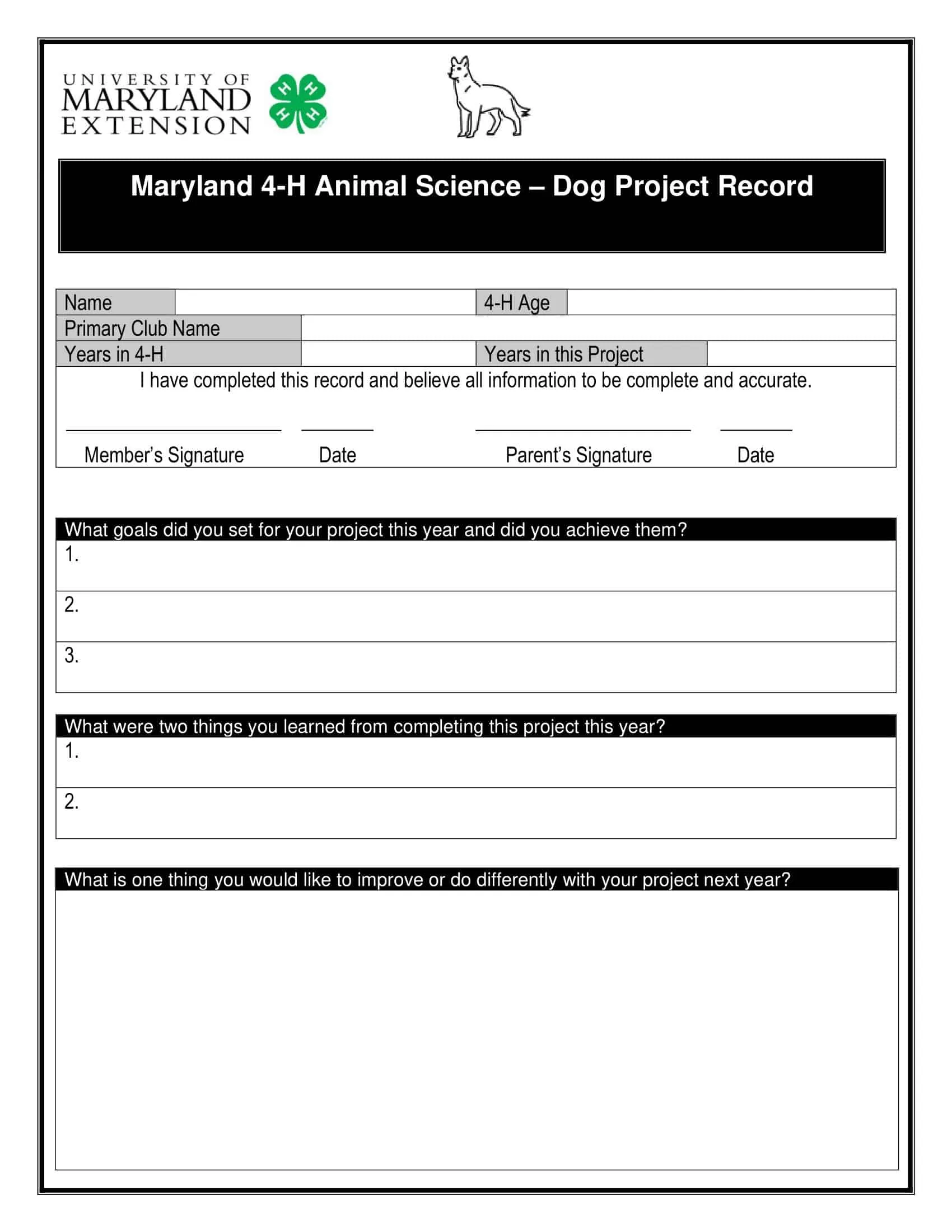
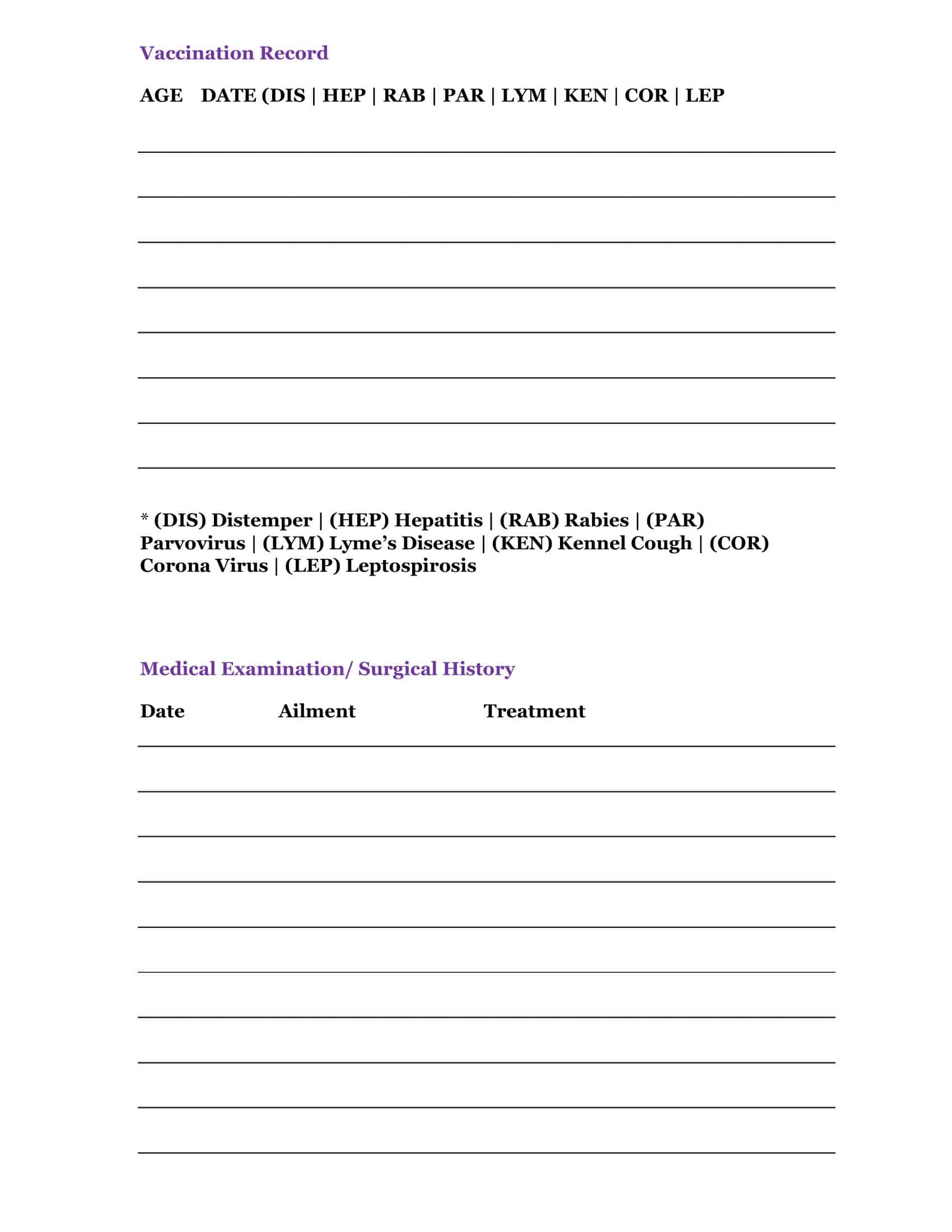







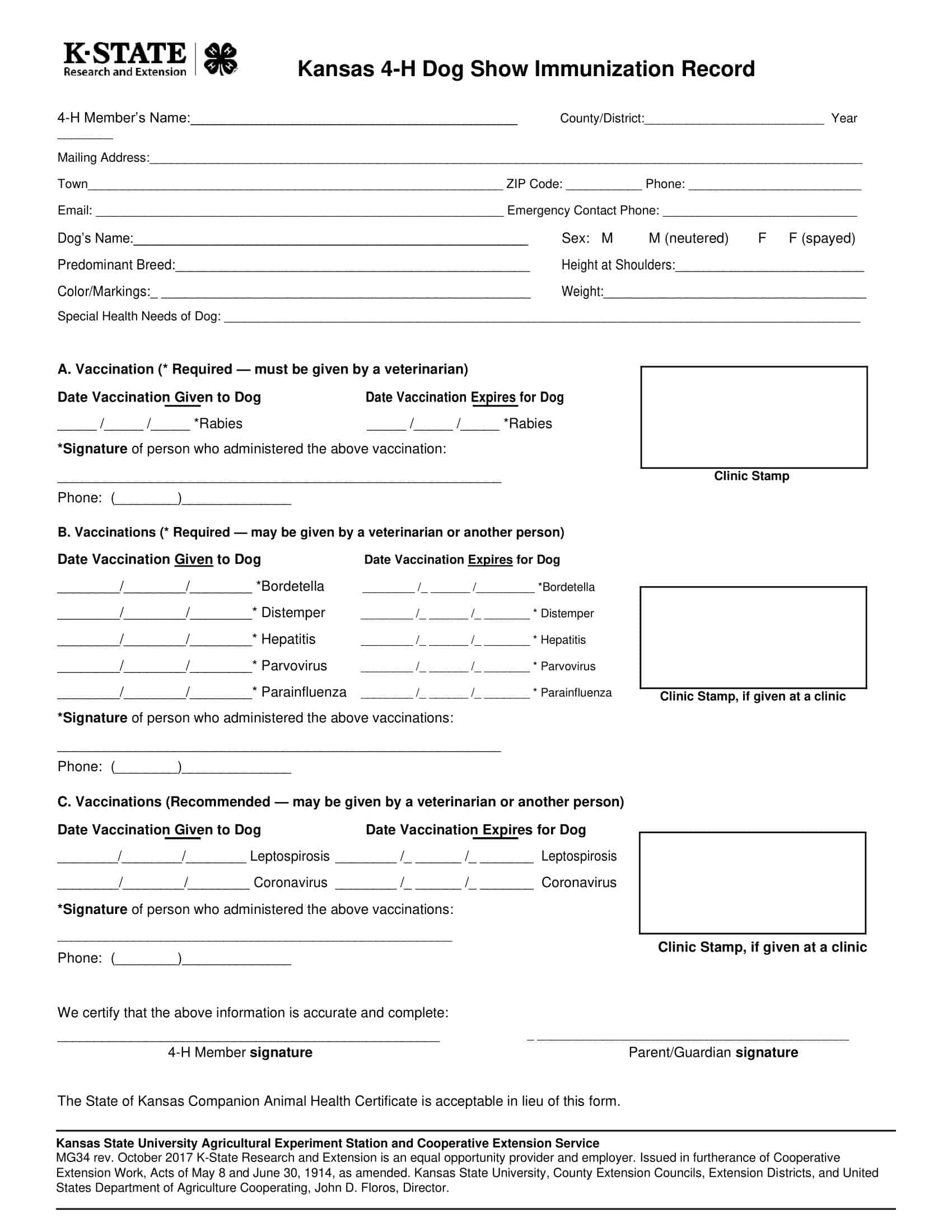









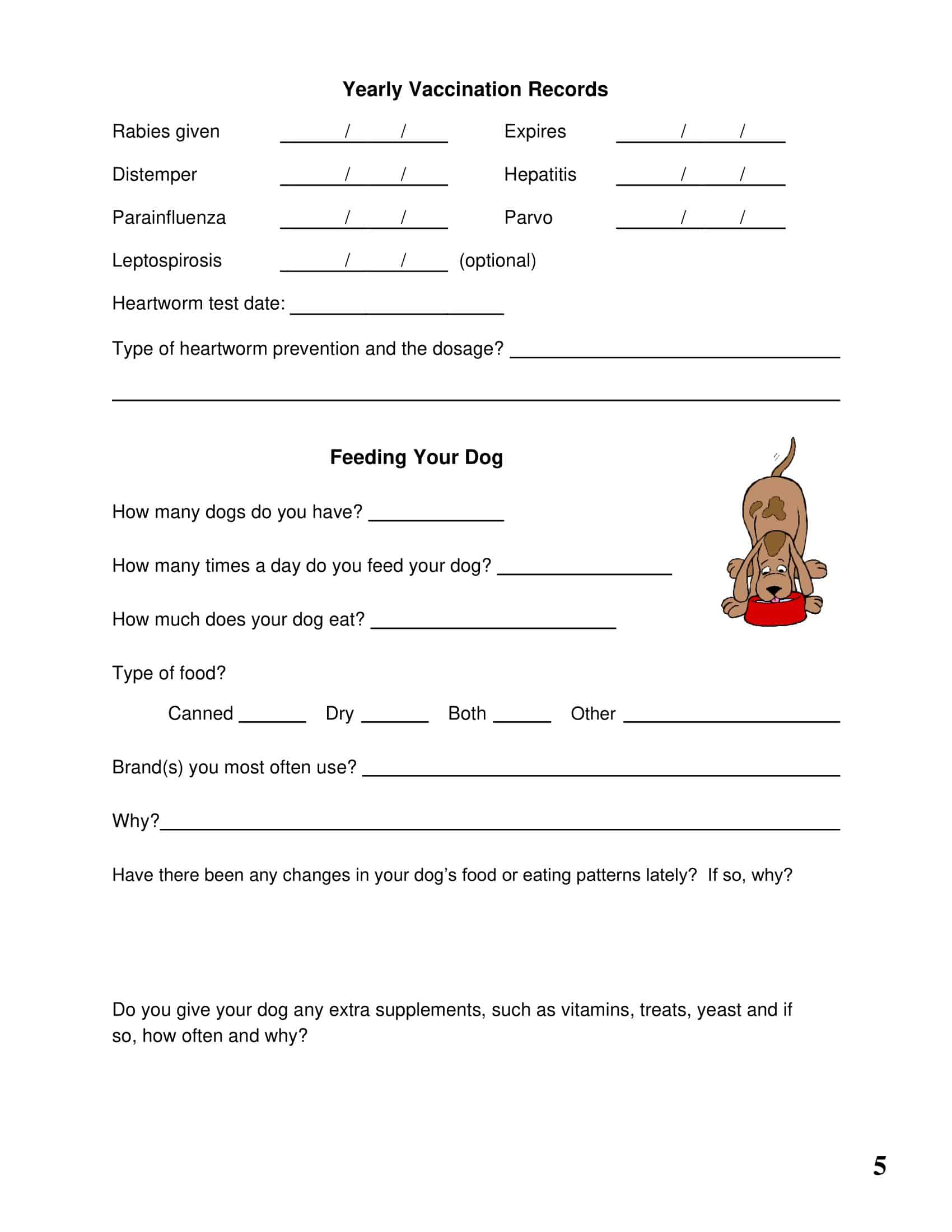






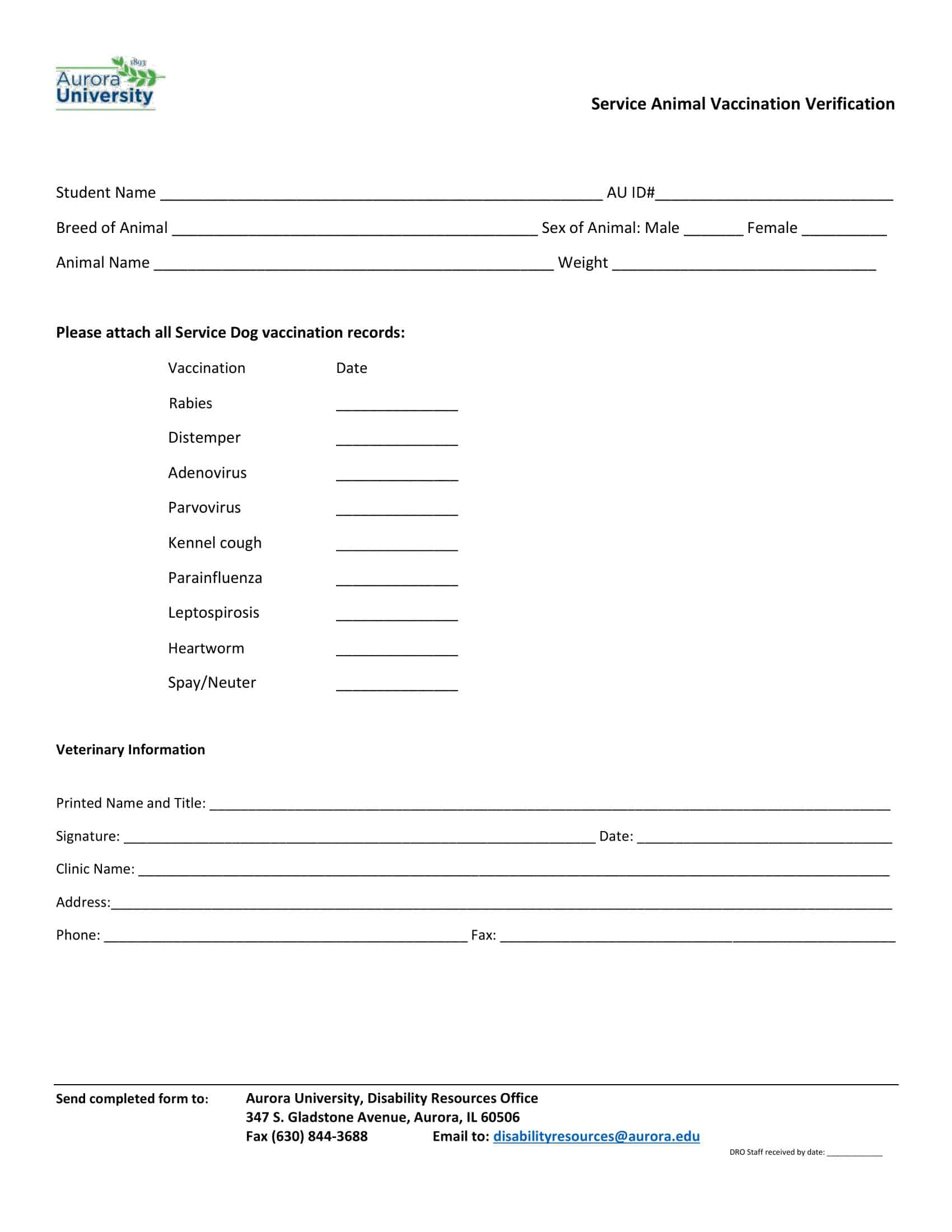
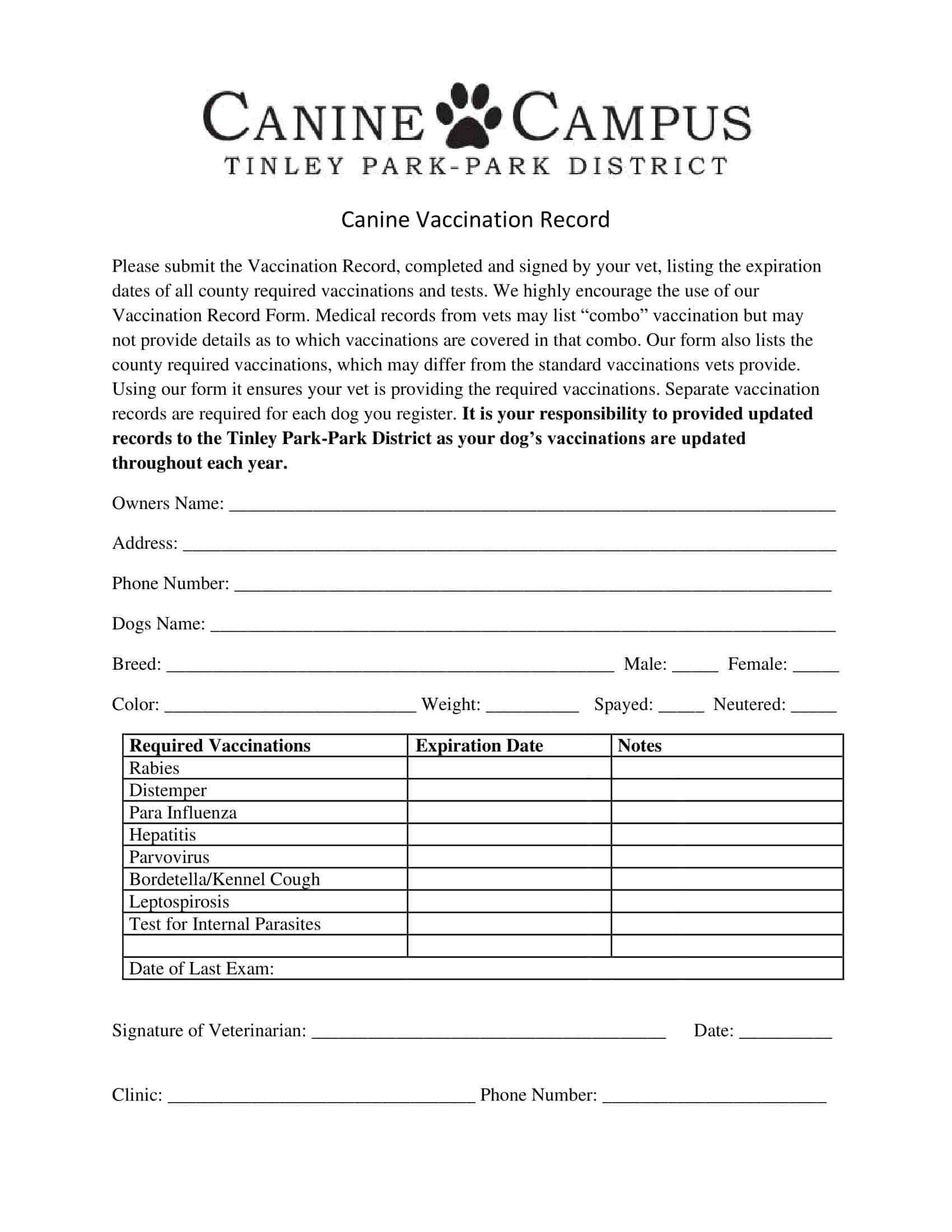


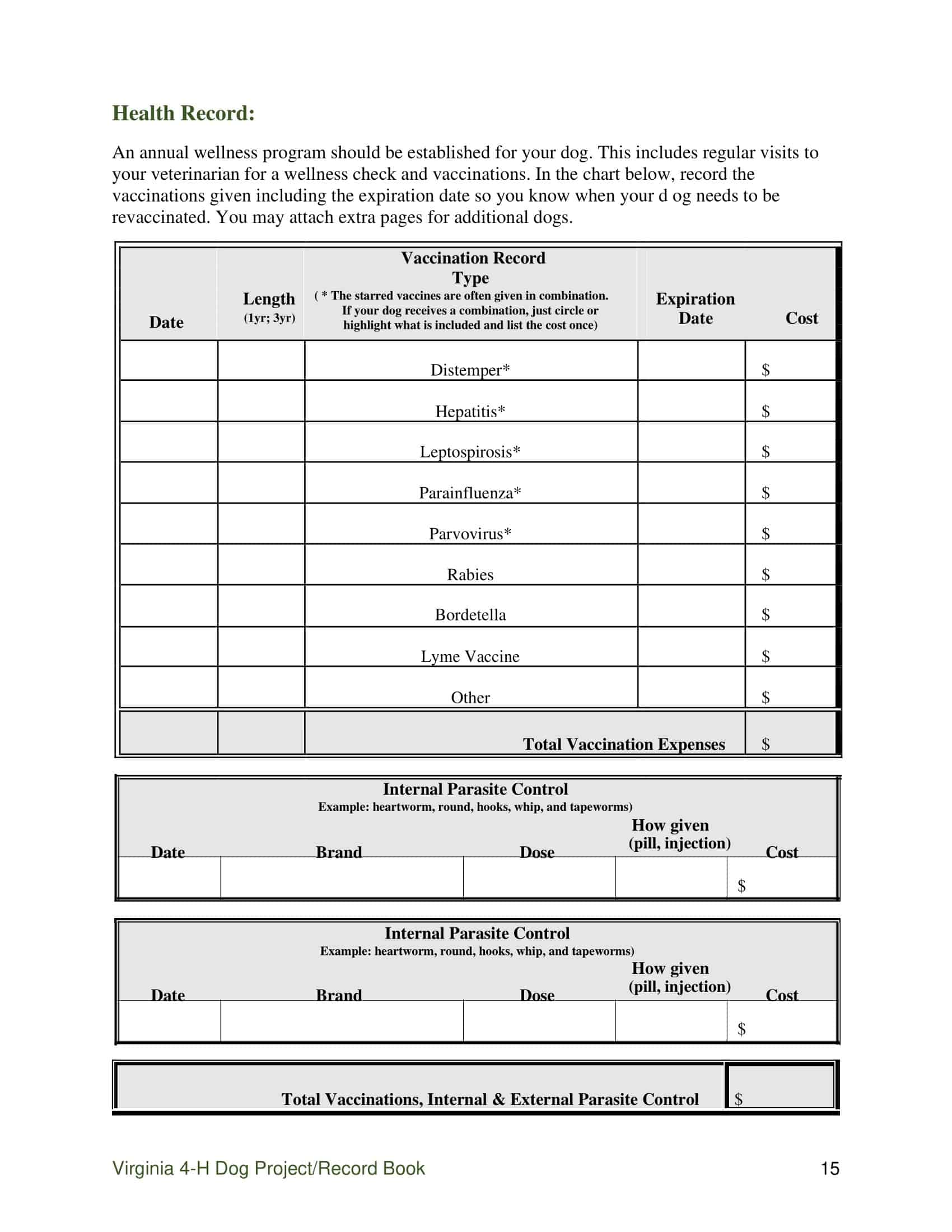
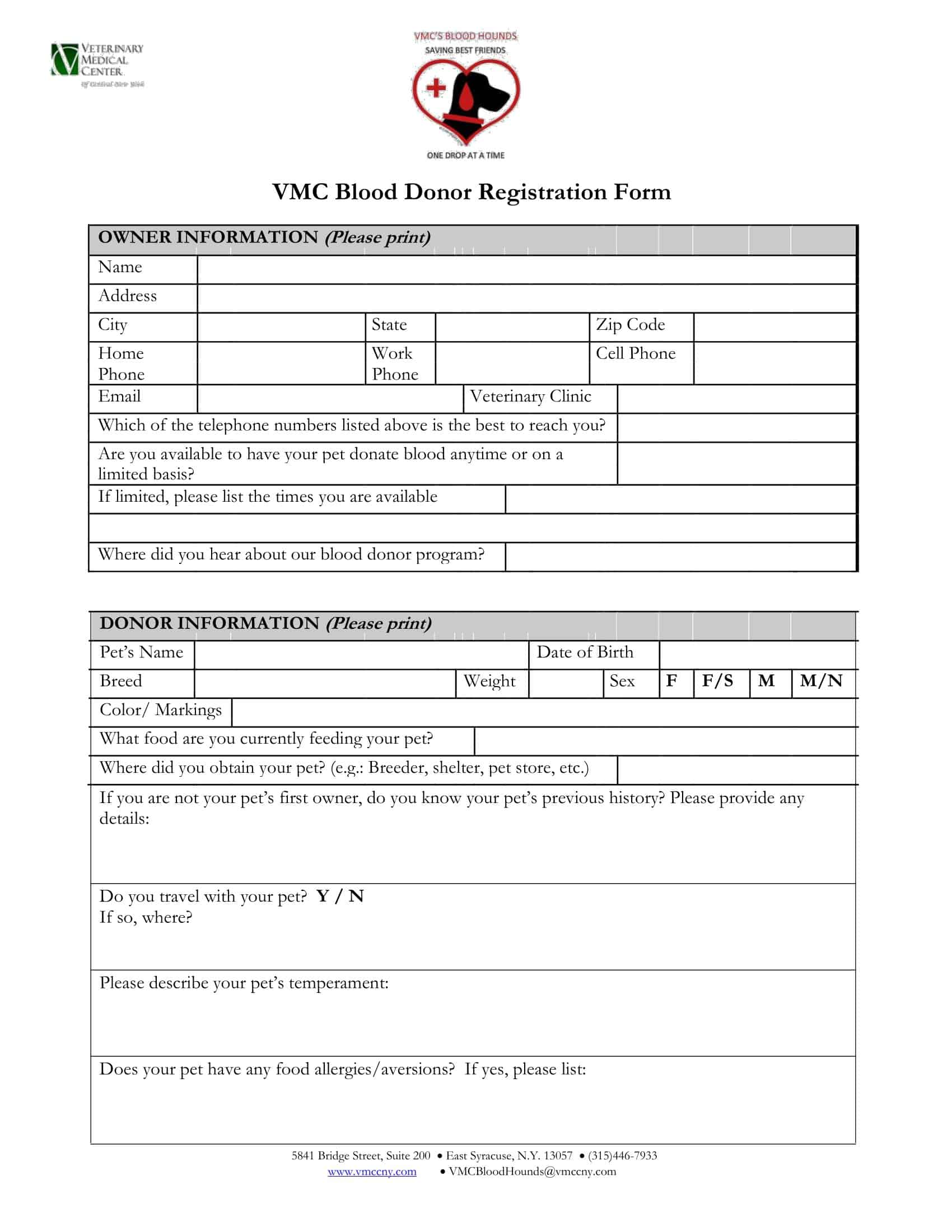



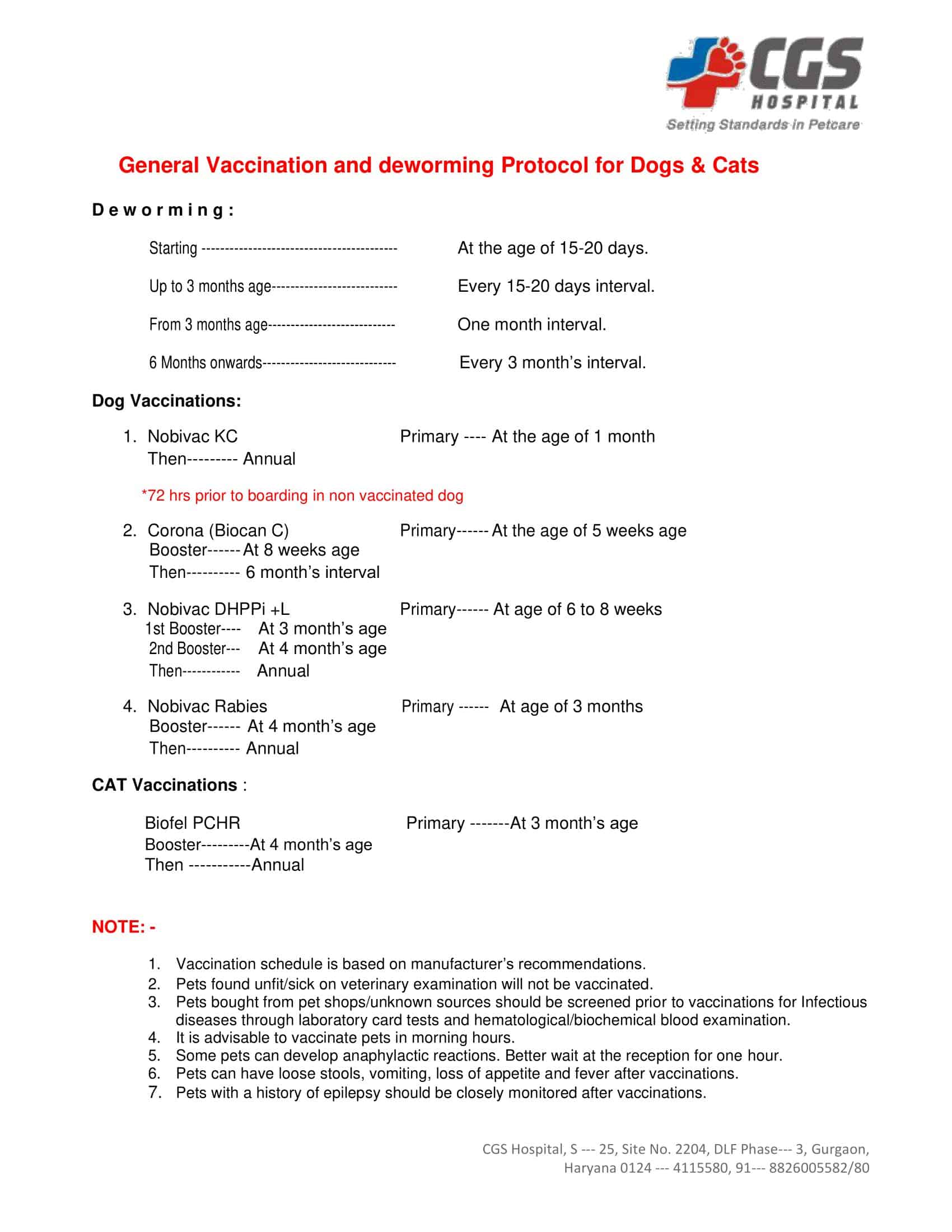

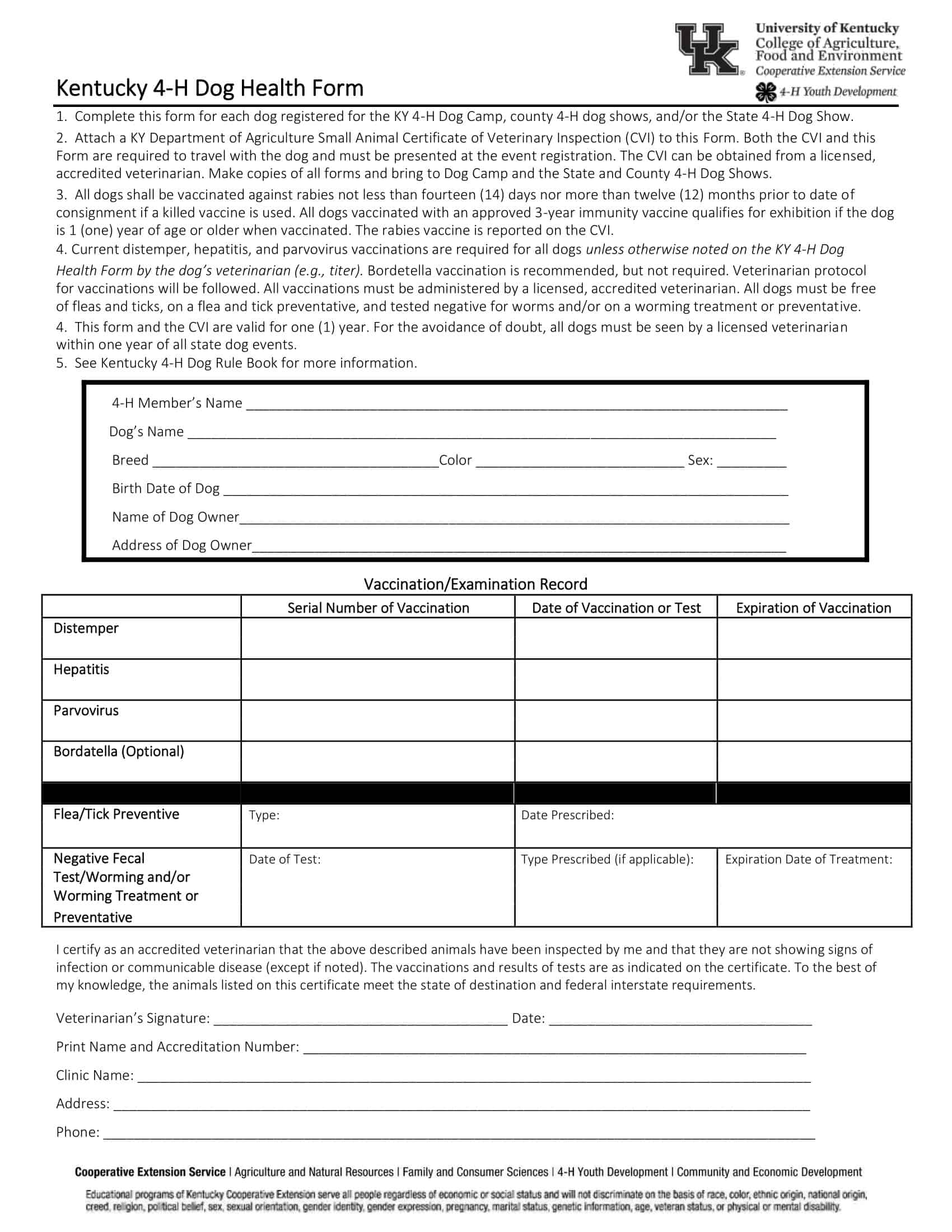

![Free Printable Medical Health History Form Templates [PDF] Example 2 Medical Health History Form](https://www.typecalendar.com/wp-content/uploads/2023/05/Medical-Health-History-Form-1-150x150.jpg)

